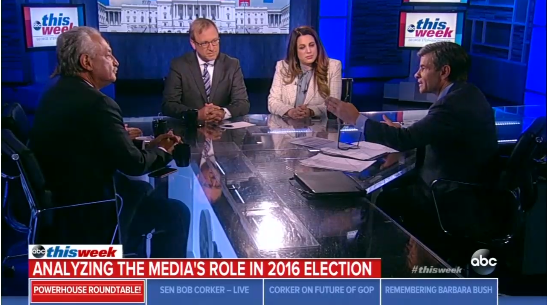 In a stunning moment of candor from ABC host George Stephanopoulos during Sunday’s This Week, the longtime Clinton flack lamented the media coverage Hillary Clinton received during the 2016 election. During the “powerhouse roundtable” discussion analyzing the media’s role in 2016 (yes, they’re still hung up on it), he was put off how media equalized Clinton and Donald Trump when it came to their wrongdoings.
In a stunning moment of candor from ABC host George Stephanopoulos during Sunday’s This Week, the longtime Clinton flack lamented the media coverage Hillary Clinton received during the 2016 election. During the “powerhouse roundtable” discussion analyzing the media’s role in 2016 (yes, they’re still hung up on it), he was put off how media equalized Clinton and Donald Trump when it came to their wrongdoings.
According to Democratic strategist Stephanie Cutter, the serious question the media needed to work out for themselves was: “The question is there, are you writing to make something breakthrough or are you writing what you think the news is?” “I think, it's a big question for all of us,” Stephanopoulos agreed. “You look back and say, listen, there were things done wrong. No question about that.”
But according to him, the biggest problem the media had was reporting the wrongdoings on both sides. “But there's something structurally in the media where we have to equalize everything,” he bemoaned. “If you point out a wrongdoing on one side, you have to point at a wrongdoing on the other and they automatically become equivalent and that isn’t always fair.”
ABC White House correspondent Jon Karl disagreed saying Trump wasn’t treated like a normal candidate. “I think the problem may have been not enough equalization. I don’t think it’s a problem how much we covered,” he said. “He was portrayed as a phenomenon, the excitement, the attacks, the latest outrageous thing he said, or whatever.”
“There wasn’t much investigative reporting going on until it was, frankly, until it was too late,” Karl then complained.
The actual problem with the media was that Clinton was their candidate and they would do everything to protect her. There really wasn’t the equalization that Stephanopoulos was whining about. Despite victories, CNN was badgering Senator Bernie Sanders (I-VT) on when he was going to drop out of the Democratic. And on NBC, Clinton fangirl Andrea Mitchell was suggesting that an AP report detailing special favors for Clinton Foundation donors was just an annoying “headache.”
A member of Stephanopoulos’ “powerhouse roundtable” even proved that point.
“It was difficult during that campaign to get any other stories to break through. And in fairness, we covered all of her policies. I tried to write sympathetic biographical features,” groaned New York Times reporter Amy Chozick. She even seemed to admit she was seeking the approval of the Clinton campaign while writing her “sympathetic” features:
The perfect example is, I wrote this sympathetic biographical feature about her moving to Arkansas and this feminist mentor of hers trying to talk her out of it. I spent a year on the story. The campaign didn't want it. It was a great story for her. It posted three hours before Comey sent his letter to Congress. It didn't even make the paper.
It should be ridiculous for anyone in the media to take issue with reporting the wrongdoing from any political figure, but that’s where we seem to be now. Instead of worry about it equalizing the candidates, how about worrying about the issues that led to those candidates getting nominated in the first place?
The transcript is below, click "expand" to read:
ABC
This Week
April 22, 2018
9:38:18 AM Eastern(…)
AMY CHOZICK: It was difficult during that campaign to get any other stories to break through. And in fairness, we covered all of her policies. I tried to write sympathetic biographical features. The perfect example is I wrote this sympathetic biographical feature about her moving to Arkansas and this feminist mentor of hers trying to talk her out of it. I spent a year on the story. The campaign didn't want it. It was a great story for her. It posted three hours before Comey sent his letter to Congress. It didn't even make the paper.
[Crosstalk]
STEPHANIE CUTTER: The question is there, are you writing to make something breakthrough or are you writing what you think the news is? And that is a question that I think we all have to ask going into the next election.
GEORGE STEPHANOPOULOS: I think, it's a big question for all of us. You look back and say, listen, there were things done wrong. No question about that. But there's something structurally in the media where we have to equalize everything. If you point out a wrongdoing on one side, you have to point at a wrongdoing on the other and they automatically become equivalent and that isn’t always fair.
JON KARL: I think the problem may have been not enough equalization. I don’t think it’s a problem how much we covered. How much the press covered the e-mails. How much investigative work was done on Donald Trump. Particularly during the primaries.
CUTTER: Not enough.
KARL: He was portrayed as a phenomenon, the excitement, the attacks, the latest outrageous thing he said, or whatever. There wasn’t much investigative reporting going on until it was, frankly, until it was too late.
(…)




